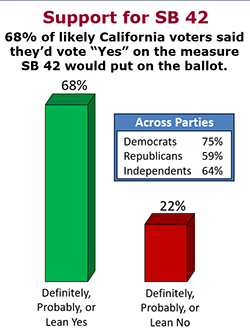Supreme Court rulings leave little room to regulate the
influence of big money on political campaigns except in one
very important area: disclosure. Corporations, unions and
other organizations have unfettered rights to bankroll
campaigns, but at least they can still be required to
clearly disclose who's writing the checks.
Yet for the second year, Californians' attempt to pass a
law requiring clear disclosure of who's funding campaigns
is in trouble. Voters and good-government organizations
need to gang up on the Assembly by Saturday, when the
DISCLOSE Act, SB 52, is scheduled for a floor vote.
Powerful opponents empowered by Citizens United to wield
unlimited financial influence would prefer to do it
anonymously, and they are besieging their
bought-and-paid-for pawns in the Assembly.
No, it's not the Koch Brothers. It's not Chevron or the
NRA. Here's a hint: this is a Democratic Assembly.
That's right. It's unions. Specifically the Service
Employees International Union and the California Teachers
Association -- which happen to be among the largest
campaign spenders in the state, according to Maplight, the
nonpartisan research group that tracks money in
politics.
The DISCLOSE Act was authored by Sens. Jerry Hill, D-San
Mateo, and Mark Leno, D-San Francisco. It would require
campaign material to include a readable (no fine print) and
factual list of its three top funders instead of using
generic committee names like "Citizens for Mom and Apple
Pie" and a general description of the members. Donors
usually can be found in filings with the Secretary of
State, but if you don't go looking, and if news reporters
aren't covering the campaigns, you'd never know.
The Senate has done its part, but Democrats' support in the
Assembly is wavering. We'll be watching Bay Area lawmakers
on this one, and if you care about transparency, contact
your own representative. Find him or her at
findyourrep.legislature.ca.gov/.
We don't agree with the Supreme Court ruling in Citizens
United. Neither corporations nor unions should have the
same free-speech rights as individuals to spend unlimited
amounts of money to influence public policy. We suspect the
Founding Fathers would be appalled.
But if we had to choose between trying to limit spending
and requiring full, clear and immediate disclosure of who's
bankrolling campaigns, we'd take disclosure in a heartbeat.
People can make educated judgments about barrages of
campaign claims when they understand who is behind them.





